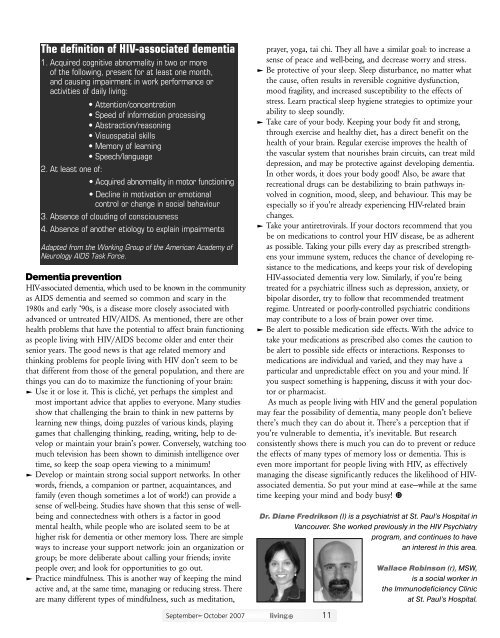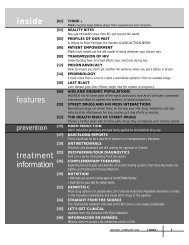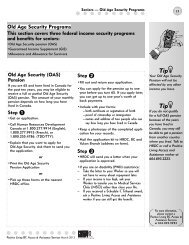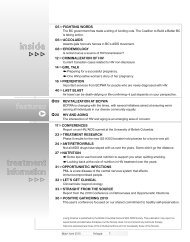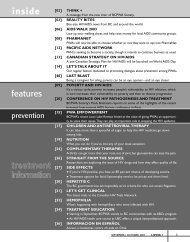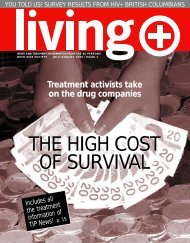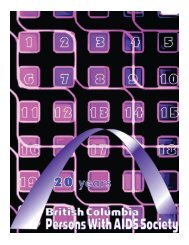iv poz mag.qxd - Positive Living BC
iv poz mag.qxd - Positive Living BC
iv poz mag.qxd - Positive Living BC
Create successful ePaper yourself
Turn your PDF publications into a flip-book with our unique Google optimized e-Paper software.
issue 50.<strong>qxd</strong>:l<strong>iv</strong> <strong>poz</strong> <strong>mag</strong>.<strong>qxd</strong> 9/3/07 4:04 PM Page 11<br />
The definition of HIV-associated dementia<br />
1. Acquired cognit<strong>iv</strong>e abnormality in two or more<br />
of the following, present for at least one month,<br />
and causing impairment in work performance or<br />
act<strong>iv</strong>ities of daily l<strong>iv</strong>ing:<br />
• Attention/concentration<br />
• Speed of information processing<br />
• Abstraction/reasoning<br />
• Visuospatial skills<br />
• Memory of learning<br />
• Speech/language<br />
2. At least one of:<br />
• Acquired abnormality in motor functioning<br />
• Decline in mot<strong>iv</strong>ation or emotional<br />
control or change in social behaviour<br />
3. Absence of clouding of consciousness<br />
4. Absence of another etiology to explain impairments<br />
Adapted from the Working Group of the American Academy of<br />
Neurology AIDS Task Force.<br />
Dementia prevention<br />
HIV-associated dementia, which used to be known in the community<br />
as AIDS dementia and seemed so common and scary in the<br />
1980s and early ‘90s, is a disease more closely associated with<br />
advanced or untreated HIV/AIDS. As mentioned, there are other<br />
health problems that have the potential to affect brain functioning<br />
as people l<strong>iv</strong>ing with HIV/AIDS become older and enter their<br />
senior years. The good news is that age related memory and<br />
thinking problems for people l<strong>iv</strong>ing with HIV don’t seem to be<br />
that different from those of the general population, and there are<br />
things you can do to maximize the functioning of your brain:<br />
q Use it or lose it. This is cliché, yet perhaps the simplest and<br />
most important advice that applies to everyone. Many studies<br />
show that challenging the brain to think in new patterns by<br />
learning new things, doing puzzles of various kinds, playing<br />
games that challenging thinking, reading, writing, help to develop<br />
or maintain your brain’s power. Conversely, watching too<br />
much television has been shown to diminish intelligence over<br />
time, so keep the soap opera viewing to a minimum!<br />
q Develop or maintain strong social support networks. In other<br />
words, friends, a companion or partner, acquaintances, and<br />
family (even though sometimes a lot of work!) can provide a<br />
sense of well-being. Studies have shown that this sense of wellbeing<br />
and connectedness with others is a factor in good<br />
mental health, while people who are isolated seem to be at<br />
higher risk for dementia or other memory loss. There are simple<br />
ways to increase your support network: join an organization or<br />
group; be more deliberate about calling your friends; invite<br />
people over; and look for opportunities to go out.<br />
q Practice mindfulness. This is another way of keeping the mind<br />
act<strong>iv</strong>e and, at the same time, managing or reducing stress. There<br />
are many different types of mindfulness, such as meditation,<br />
prayer, yoga, tai chi. They all have a similar goal: to increase a<br />
sense of peace and well-being, and decrease worry and stress.<br />
q Be protect<strong>iv</strong>e of your sleep. Sleep disturbance, no matter what<br />
the cause, often results in reversible cognit<strong>iv</strong>e dysfunction,<br />
mood fragility, and increased susceptibility to the effects of<br />
stress. Learn practical sleep hygiene strategies to optimize your<br />
ability to sleep soundly.<br />
q Take care of your body. Keeping your body fit and strong,<br />
through exercise and healthy diet, has a direct benefit on the<br />
health of your brain. Regular exercise improves the health of<br />
the vascular system that nourishes brain circuits, can treat mild<br />
depression, and may be protect<strong>iv</strong>e against developing dementia.<br />
In other words, it does your body good! Also, be aware that<br />
recreational drugs can be destabilizing to brain pathways involved<br />
in cognition, mood, sleep, and behaviour. This may be<br />
especially so if you’re already experiencing HIV-related brain<br />
changes.<br />
q Take your antiretrovirals. If your doctors recommend that you<br />
be on medications to control your HIV disease, be as adherent<br />
as possible. Taking your pills every day as prescribed strengthens<br />
your immune system, reduces the chance of developing resistance<br />
to the medications, and keeps your risk of developing<br />
HIV-associated dementia very low. Similarly, if you’re being<br />
treated for a psychiatric illness such as depression, anxiety, or<br />
bipolar disorder, try to follow that recommended treatment<br />
regime. Untreated or poorly-controlled psychiatric conditions<br />
may contribute to a loss of brain power over time.<br />
q Be alert to possible medication side effects. With the advice to<br />
take your medications as prescribed also comes the caution to<br />
be alert to possible side effects or interactions. Responses to<br />
medications are ind<strong>iv</strong>idual and varied, and they may have a<br />
particular and unpredictable effect on you and your mind. If<br />
you suspect something is happening, discuss it with your doctor<br />
or pharmacist.<br />
As much as people l<strong>iv</strong>ing with HIV and the general population<br />
may fear the possibility of dementia, many people don’t believe<br />
there’s much they can do about it. There’s a perception that if<br />
you’re vulnerable to dementia, it’s inevitable. But research<br />
consistently shows there is much you can do to prevent or reduce<br />
the effects of many types of memory loss or dementia. This is<br />
even more important for people l<strong>iv</strong>ing with HIV, as effect<strong>iv</strong>ely<br />
managing the disease significantly reduces the likelihood of HIVassociated<br />
dementia. So put your mind at ease—while at the same<br />
time keeping your mind and body busy! 5<br />
Dr. Diane Fredrikson (l) is a psychiatrist at St. Paul’s Hospital in<br />
Vancouver. She worked previously in the HIV Psychiatry<br />
program, and continues to have<br />
an interest in this area.<br />
Wallace Robinson (r), MSW,<br />
is a social worker in<br />
the Immunodeficiency Clinic<br />
at St. Paul’s Hospital.<br />
SeptemberqOctober 2007 l<strong>iv</strong>ing5 11


